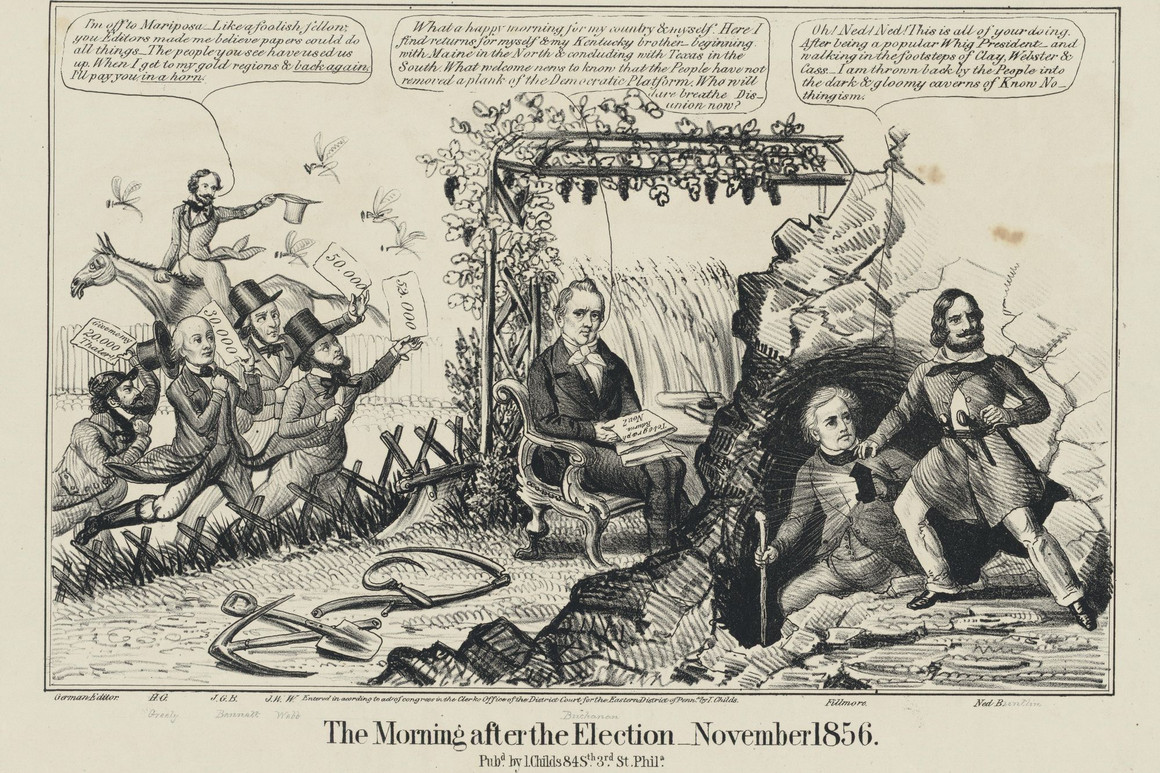
As the Qanon prophecies fail and the cult-members struggle to resolve their cognitive dissonance, it's a good time to revisit the history of paranoid, conspiratorial political movements in American history - the "paranoid style" that has dominated since the Revolution.
1/
1/

After all, the very first skirmishes of the US war of independence were based on a conspiracy theory: that the levy on tea was a prelude to a sellout of the colonists to transnational mercantalist interests. US politics have always been conspiratorial.
2/
2/
I found @zacharykarabell's @politico history of the Know Nothing party especially useful, as it tells the story of what happens when surging, paranoid, fractious political movements implode.
politico.com/news/magazine/…
3/
politico.com/news/magazine/…
3/
The American Party was a secret 19th century organization founded on a conspiracy theory: that Irish immigrants were secretly planning a takeover of the US on behalf of the Pope.
4/
4/
The American Party believed that the Irish were coming for their jobs, and for the very culture that defined America. They circulated rumors about nuns engaging in ritual infanticide and sex-trafficking teen girls. The Qanon parallels are strong.
5/
5/
The American Party (later the Native American Party) started off in the shadows. If anyone asked a member about the organization, they'd say "I know nothing," which is how they came to be called the "Know Nothing Party."
6/
6/
The Know Nothings became a political force thanks to the vacuum left behind by the implosion of the Whig party. The KNs promulgated anti-immigrant laws that promised preferential access to jobs for native-born Americans.
7/
7/
But the KNs were unhinged, riven by infighting, and, after a decade and a half, they basically vanished from the American political landscape, mostly absorbed into the new Republican party.
8/
8/
Their legacy is mixed - on the one hand, the simmering xenophobia expressed as concern for jobs and culture on the right; on the other, the roots of the trade union movement.
9/
9/
For Karabell, the Qanon colonization of the Republican Party is an echo of the rise - and fall - of the Know Nothings, as a mix of conspiratorialism, legitimate anti-corruption grievance, and xenophobia triggers a collapse.
10/
10/
Dismissals of conspiratorial movements - for example, stories that blame Big Tech's "algorithmic radicalization" mind-control rays for conspiracism - treat conspiracies as being rooted in ideas, rather than the material world.
11/
11/

That's a mistake - and it's one that gives conspiracists far too much credit. Conspiracies don't take hold because Alex Jones or Marjorie Taylor Greene are so good at explaining them that they cloud their victims' minds and bypass their critical faculties.
12/
12/
After all, Jones and Greene are fucking idiots, not super-geniuses.
What they tap into - what predicts the rise of conspiracy - is experiencing real conspiracies that hurt you and the people that you love (another word for "real conspiracy" is "corruption").
13/
What they tap into - what predicts the rise of conspiracy - is experiencing real conspiracies that hurt you and the people that you love (another word for "real conspiracy" is "corruption").
13/
A really striking essay about this is @WiseTenderSnob's "This Secret Message Could Change Your Life!" - about evangelical Christianity, wellness culture, conspiratorialism and "pastel Q" (the Instagram-spread, female-coded Qanon flavor).
wisetendersnob.medium.com/this-secret-me…
14/
wisetendersnob.medium.com/this-secret-me…
14/
I was especially struck by the connection between "alt-nutrition" philosophies and conspiratorialism. The thing is, our food advice really has been corrupt: as @garytaubes wrote about in his 2002 @nytimes essay, "What if It's All Been a Big Fat Lie?"
nytimes.com/2002/07/07/mag…
15/
nytimes.com/2002/07/07/mag…
15/
Taubes describes how the familiar "food pyramid" that advised eating lots and lots of carbohydrates while eliminating fats had been bought-and-paid-for by Big Ag, and how that advice had triggered an obesity epidemic.
16/
16/
Taubes's essay hit me square in the gut. I was a fat kid, with fat grandparents, and a mom who'd fought her weight all her life. As I hit my thirties, I was assiduously eating pasta and bread (with margarine) and other low-fat, high-carb food, and getting fatter and fatter.
17/
17/
After reading Taubes, I switched to eating high-fat, high-protein, near-zero-carb. After a couple weeks, all my cravings disappeared. A year later, I was 100lbs lighter - without any additional exercise, on a diet of steak, cheese, and cream lattes.
18/
18/
I've gained about 50lbs of that back in the intervening years, 20+ of it in the past year. It's a source of real anxiety for me. I've got serious body issues, weight-gain-triggered depression that I manage, even as I exercise daily and count calories.
19/
19/
I couldn't keep up my all-steak diet - too much worry about my ageing body and the roasting planet - but its lesson stuck with me: corporations bought off the science of nutrition and made me miserable for decades and decades.
20/
20/
As Steiber writes, the people who fall into Pastel Q have had similar experiences: switching from the food and lifestyle choices that corporations and governments promote, and experiencing life-changing benefits.
21/
21/
The wellness movement isn't just a way for huxters to sell you supplements: it's also a response to corruption in dietary advice, driven by the commercial priorities of the increasingly monopolized packaged food, fast food, and ag industries.
22/
22/
Likewise, the Q conspiracy about rampant, elite, unaccountable child abuse is rooted in the real child abuse rings inside of "the Roman Catholic Church, Southern Baptists, Independent Baptists, Kundalini Yoga-centered 3HO, Shambhala Buddhism, Boy Scouts of America...
23/
23/
"...college football programs, USA Gymnastics, high school sports, police departments, and US federal agencies."
Q may implode like the Know Nothings, but the corruption that gives conspiracy theories explanatory power will continue to spur new conspiratorial movements.
24/
Q may implode like the Know Nothings, but the corruption that gives conspiracy theories explanatory power will continue to spur new conspiratorial movements.
24/
If you'd like to read and share thread this as a single blog post on a site with no ads, tracking or surveillance, here's a link to it on Pluralistic:
pluralistic.net/2021/01/31/rhy…
eof/
pluralistic.net/2021/01/31/rhy…
eof/
• • •
Missing some Tweet in this thread? You can try to
force a refresh












